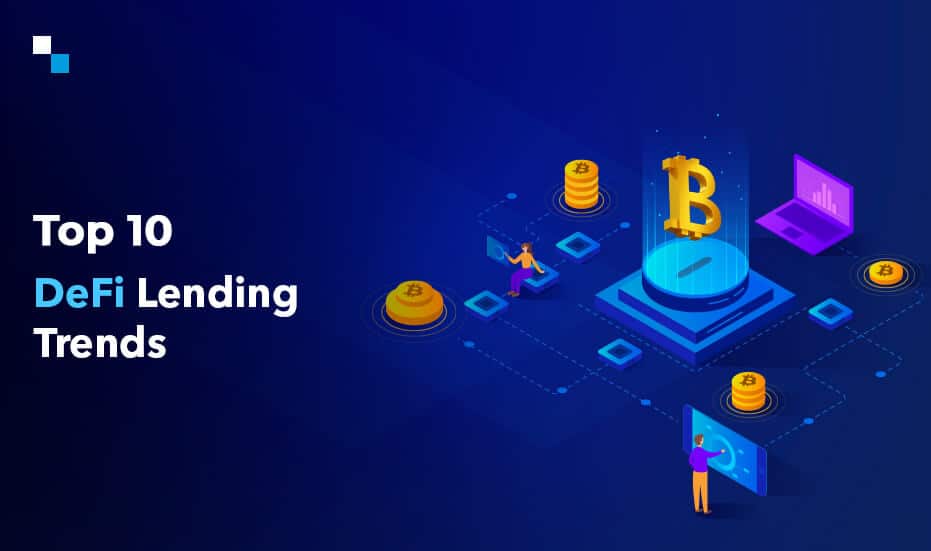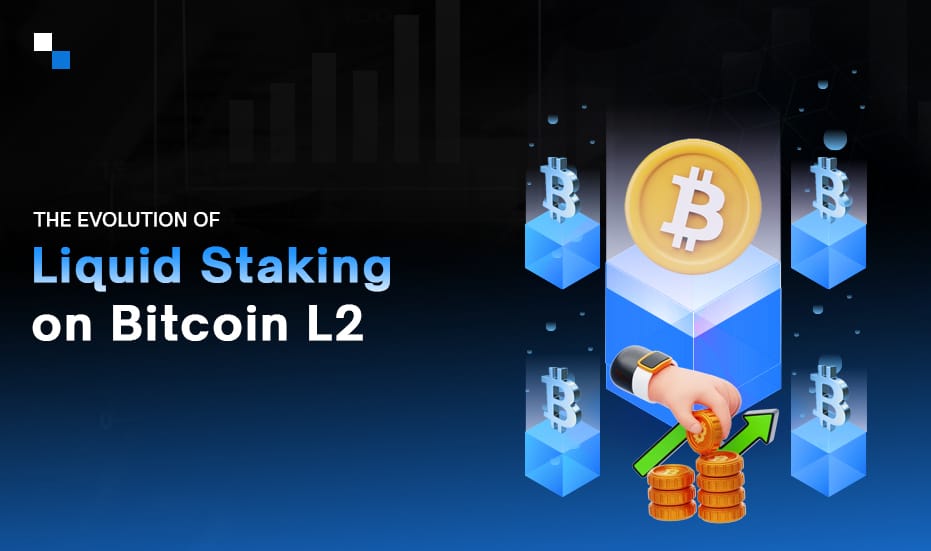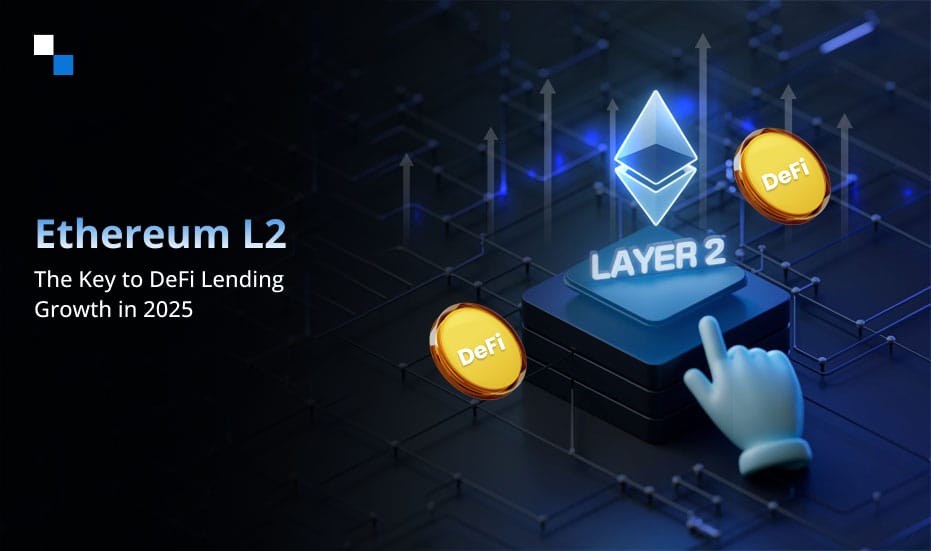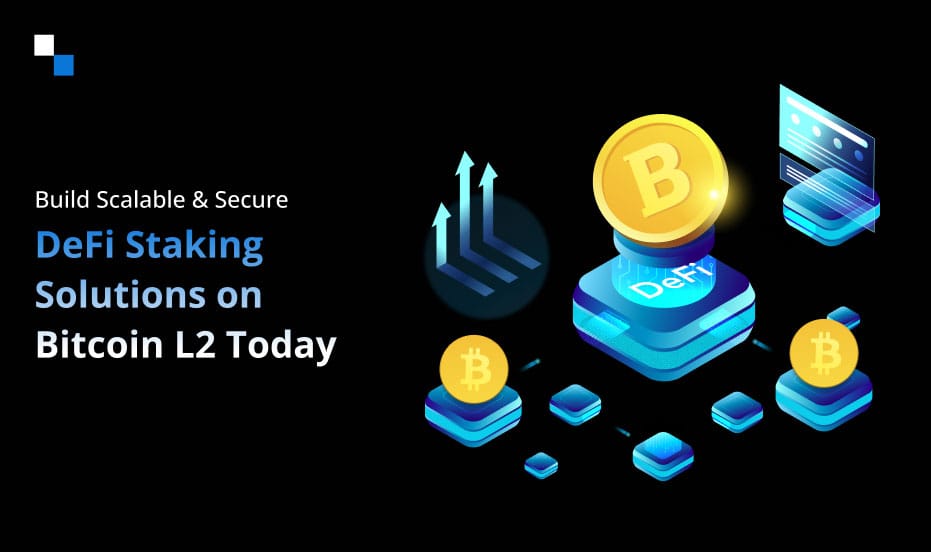
Web3: The Driving Force Behind the DeFi Revolution
November 9, 2023
20 Secrets Behind Mobile Crypto Wallet App Mastering The Crypto Assets
November 10, 2023In the ever-evolving world of decentralized finance (DeFi), lending platforms have emerged as one of the cornerstones of this financial revolution. DeFi lending platform development offers a borderless, transparent, and accessible way to borrow and lend digital assets without relying on traditional financial institutions. To keep pace with the rapidly changing DeFi landscape, it’s essential to explore the latest trends and innovations in DeFi lending. In this blog, we’ll take a deep dive into what’s currently shaping the DeFi lending ecosystem.
Flash Loans
Flash loans are a type of uncollateralized loan that can be taken out and repaid within the same block on a blockchain. It means that the borrower does not need to put up any collateral to take out the loan, and the loan must be repaid in full before the block is finalized. Flash loans are made possible by the atomicity of blockchain transactions, which means that all operations within a transaction must either all succeed, or all fail.
Flash loans are a powerful tool that can be used for a variety of purposes, such as arbitrage, liquidation, and collateral swaps.
How Do Flash Loans Work?
Flash loans are typically executed using the following steps:
- The borrower submits a request for a flash loan to a lending pool.
- The lending pool approves the request and sends the borrowed funds to the borrower’s smart contract.
- The borrower’s smart contract executes a series of transactions using the borrowed funds.
- If all of the transactions in the borrower’s smart contract are successful, the block is finalized, and the borrowed funds are returned to the lending pool.
- If any of the transactions in the borrower’s smart contract fail, the entire transaction is rolled back, and the borrowed funds are never sent to the borrower.
Benefits of Flash Loans
Flash loans offer several potential benefits, including:
- No Collateral Required: Flash loans do not require collateral, which makes them accessible to a wider range of borrowers.
- Speed and Efficiency: Flash loans can be executed very quickly and efficiently, as all transactions within a block are processed simultaneously.
- Arbitrage Opportunities: Flash loans can be used to arbitrage price differences between different exchanges.
- Liquidation Opportunities: Flash loans can be used to liquidate undercollateralized loans.
- Collateral Swaps: Flash loans can be used to swap collateral.
Algorithmic Stablecoins
Algorithmic stablecoins are a type of cryptocurrency that uses an algorithm to maintain its peg to a fiat currency or another stable asset. Unlike collateralized stablecoins, which are backed by reserves of physical assets, algorithmic stablecoins rely on a combination of code and market forces to maintain their value.
How Do Algorithmic Stablecoins Work?
Algorithmic stablecoins typically use two mechanisms to maintain their peg:
- Minting and Burning: When the price of the stablecoin falls below its peg, the algorithm will mint new tokens and sell them on the market. This increases the supply of the stablecoin and drives the price back up. Conversely, when the price of the stablecoin rises above its peg, the algorithm will burn tokens, reducing the supply and pushing the price back down.
- Feedback Mechanism: Algorithmic stablecoins often incorporate a feedback mechanism that adjusts the algorithm’s parameters in response to market conditions. This helps to keep the stablecoin’s price stable even in volatile market conditions.
Benefits of Algorithmic Stablecoins
Algorithmic stablecoins offer several potential benefits over collateralized stablecoins, including:
- Increased Capital Efficiency: Algorithmic stablecoins do not require reserves of physical assets, which means that they can be more capital-efficient than collateralized stablecoins. This can lead to lower transaction fees and more efficient lending markets.
- Greater Decentralization: Algorithmic stablecoins are typically governed by decentralized autonomous organizations (DAOs), which means that they are not controlled by any single entity. This can make them more resistant to censorship and manipulation.
- Improved Flexibility: Algorithmic stablecoins can be more flexible than collateralized stablecoins because they are not limited by the availability of reserves. It means that they can be used to support a wider range of applications, such as decentralized finance (DeFi) protocols.
Multi-Chain Lending
Multi-chain lending in DeFi refers to the practice of borrowing and lending cryptocurrency assets across multiple blockchains. This is made possible by the use of cross-chain bridges, which allow assets to be transferred between different blockchains. New defi lending Platform Development services providers incorporate multi-chain lending into their solutions.
Multi-chain lending offers several benefits over traditional DeFi lending, which is typically limited to a single blockchain.
Benefits of Multi-chain Lending
Increased Liquidity: Multi-chain lending allows users to access a wider range of lending and borrowing opportunities, as they are not limited to the assets and protocols available on a single blockchain. This can lead to better interest rates and more opportunities for arbitrage.
Reduced Risk: Multi-chain lending can help to reduce risk by diversifying investments across multiple blockchains. This is because the failure of one blockchain is less likely to have a significant impact on the overall value of a portfolio.
Improved Accessibility: Multi-chain lending can make DeFi lending more accessible to users worldwide, as they are not limited to the protocols and exchanges that are available in their own jurisdiction.
How Does Multi-Chain Lending Work?
Multi-chain lending typically works in the following steps:
- A user deposits cryptocurrency assets into a lending pool on one blockchain.
- The assets are transferred to a cross-chain bridge, which locks up the assets on the original blockchain and mints new tokens on the destination blockchain.
- The new tokens are deposited into a lending pool on the destination blockchain.
- The user can borrow assets against their deposited collateral.
- When the user repays the loan, the borrowed assets are returned to the lending pool and the user’s collateral is released.
Cross-Chain Bridges
Cross-chain bridges are the key technology that enables multi-chain lending. There are two main types of cross-chain bridges:
- Federated bridges: These bridges are controlled by a consortium of trusted entities.
- Non-custodial bridges: These bridges do not rely on trusted entities and instead use smart contracts to secure the transfer of assets.
Liquidity Pools and Yield Farming
Liquidity pools and yield farming are fundamental concepts in decentralized finance (DeFi) lending. They play a crucial role in facilitating efficient borrowing and lending activities and incentivizing users to participate in the DeFi ecosystem.
Liquidity pools are the backbone of DeFi lending. They are essentially smart contracts that hold a pool of cryptocurrency assets from various users. These assets are available for borrowers to borrow against collateral, and lenders earn interest on their deposited assets.
Benefits of Liquidity Pools:
- Improved Liquidity: Liquidity pools provide a readily available source of liquidity for borrowers, enabling efficient borrowing and lending activities.
- Enhanced Market Efficiency: Liquidity pools help to balance supply and demand, contributing to price stability and efficient market operations.
- Reward Opportunities: Liquidity providers (LPs) who deposit assets into liquidity pools earn interest on their deposits, providing a passive income stream.
Yield Farming
Yield farming is the practice of optimizing cryptocurrency holdings to maximize returns. It often involves strategically depositing assets into liquidity pools to earn interest and engaging in other DeFi activities to generate additional rewards.
Strategies for Yield Farming:
- Liquidity Pool Provision: LPs earn interest on their deposited assets and may receive additional rewards in the form of native tokens or other incentives.
- Lending and Borrowing: Lenders earn interest on their loans, while borrowers can leverage their assets to gain exposure to yield-generating opportunities.
- Staking: Staking involves locking up tokens to support the security and operation of a blockchain network, earning rewards in return.
Governance and DAOs
Governance and Decentralized Autonomous Organizations (DAOs) play a crucial role in DeFi lending, ensuring the decentralized and transparent operation of DeFi lending protocols. Governance in DeFi lending refers to the process of making decisions about the development and operation of a DeFi lending protocol. These decisions can include things like:
- Setting interest rates
- Adding new assets
- Changing protocol parameters
Governance is typically carried out by the holders of the protocol’s native token. These token holders can vote on proposals submitted by other token holders or by the protocol’s developers.

Decentralized Autonomous Organizations (DAOs)
A DAO is an organization that is governed by a set of rules encoded in smart contracts. DAOs are often used to govern DeFi lending protocols because they are decentralized and transparent. This means that there is no single entity that can control the protocol, and all decisions are made by the token holders.
Benefits of Governance and DAOs in DeFi Lending
Increased decentralization: Governance and DAOs help to ensure that DeFi lending protocols are decentralized and not controlled by any single entity.
Improved transparency: All governance decisions are made in a transparent manner, and all token holders can see how their votes are being cast.
Enhanced community ownership: DAOs allow token holders to have a say in how the protocol is run, which can lead to a more engaged and supportive community.
NFT Collateral
NFT collateral in DeFi lending refers to the use of non-fungible tokens (NFTs) as collateral for loans. NFTs are unique digital assets that represent ownership of items such as artwork, collectibles, and in-game assets.
How NFT Collateral Lending Works
NFT collateral lending typically works in the following steps:
- A user deposits an NFT into a lending pool.
- The NFT is appraised by a decentralized oracle or a group of experts.
- The user is offered a loan based on the appraised value of the NFT.
- The user accepts the loan and receives the loan proceeds.
- The NFT is held in escrow until the loan is repaid.
- When the loan is repaid, the NFT is returned to the user.
Benefits of NFT Collateral Lending
NFT collateral lending offers several benefits over traditional collateralized lending, including:
Increased access to liquidity: NFT collateral lending allows NFT owners to access liquidity without having to sell their NFTs. This can be beneficial for NFT owners who want to hold on to their NFTs but need access to cash.
New opportunities for DeFi: NFT collateral lending open up new opportunities for DeFi, such as the development of NFT-backed derivatives and synthetic assets.
Potential for increased financial inclusion: NFT collateral lending could help to increase financial inclusion by providing access to loans to people who do not have access to traditional banking services.
Compliance and Regulation
Compliance and regulation are critical aspects of DeFi, ensuring that the ecosystem operates in a responsible and transparent manner.
Compliance in DeFi
Compliance in DeFi refers to the process of adhering to applicable laws and regulations. This includes regulations related to securities, know-your-customer (KYC), anti-money laundering (AML), and sanctions.
Compliance is important in DeFi for several reasons, including:
- Protecting investors: Compliance can help to protect investors from fraud and scams.
- Preventing financial crime: Compliance can help to prevent financial crime, such as money laundering and terrorism financing.
- Building trust and confidence: Compliance can help to build trust and confidence in DeFi, which is essential for its long-term growth and adoption.
Regulation in DeFi
Regulation in DeFi refers to the process of establishing rules and guidelines for the operation of DeFi protocols and exchanges. This is a complex and evolving area, as regulators around the world are still grappling with how to regulate DeFi effectively.
There are several reasons why regulation is important in DeFi, including:
- Protecting consumers: Regulation can help to protect consumers from harm, such as fraud and market manipulation.
- Maintaining market integrity: Regulation can help to maintain market integrity and prevent systemic risks.
- Fostering innovation: Regulation can help to foster innovation by providing a clear and predictable regulatory framework.
Institutional Involvement
institutional involvement in DeFi lending is growing rapidly as traditional financial institutions recognize the potential of this innovative technology. Institutional investors are attracted to DeFi lending by its high yields, potential for diversification, and ability to access new asset classes.
Factors Driving Institutional Involvement in DeFi Lending
Several factors are driving institutional involvement in DeFi lending, including:
- High Yields: DeFi lending protocols typically offer higher yields than traditional lending products, making them attractive to institutional investors seeking to maximize returns.
- Diversification Opportunities: DeFi lending provides access to a wider range of asset classes, including cryptocurrencies, stablecoins, and real-world assets (RWAs), allowing institutions to diversify their portfolios and reduce risk.
- Access to New Asset Classes: DeFi lending opens up opportunities to access emerging asset classes, such as decentralized finance (DeFi) tokens and non-fungible tokens (NFTs), which are not readily available in traditional finance.
Forms of Institutional Involvement in DeFi Lending
Institutional investors can participate in DeFi lending in various ways, including:
- Direct Investment in Lending Pools: Institutions can directly deposit funds into DeFi lending pools and earn interest on their deposits.
- Investing through Specialized Funds: Some investment firms have launched specialized funds that invest in DeFi lending protocols, providing institutions with access to DeFi lending opportunities without the need to manage their own crypto wallets and smart contracts.
- Utilizing Custodial Services: Institutional investors can utilize custodial services that provide secure storage and management of cryptocurrency assets, facilitating their participation in DeFi lending.
Potential Benefits of Institutional Involvement in DeFi Lending
Institutional involvement in DeFi lending can bring several potential benefits, including:
- Increased Liquidity: Increased institutional participation can enhance liquidity in DeFi lending markets, benefiting borrowers and lenders alike.
- Enhanced Risk Management: Institutional investors can bring their expertise in risk management to DeFi, contributing to the overall stability and security of the ecosystem.
- Bridging Traditional and DeFi Finance: Institutional involvement can bridge the gap between traditional finance and DeFi, fostering collaboration and innovation between the two sectors.
Decentralized Identity and Credit Scoring
Decentralized identity (DID) and credit scoring are emerging areas of focus in DeFi lending, aiming to address the limitations of traditional identity verification and credit assessment methods in this decentralized space.
Decentralized Identity (DID) in DeFi Lending
In traditional finance, identity verification relies on centralized entities such as banks and credit bureaus, which collect and manage individuals’ personal data. This centralized approach raises privacy concerns and can limit access to financial services for those without formal identification or credit history.
DID offers a decentralized alternative, providing individuals with control over their personal data and enabling self-sovereign identity management. DIDs are cryptographically secure and tamper-proof digital identities that exist on the blockchain, allowing users to selectively share verified attributes with DeFi protocols without revealing sensitive personal information.
Benefits of DID in DeFi Lending:
- Enhanced Privacy: DIDs empower users to control their data and share only necessary attributes, minimizing privacy risks and protecting sensitive information.
- Increased Accessibility: DIDs can expand access to DeFi lending for individuals without traditional identification or credit history, promoting financial inclusion.
- Improved Security: Blockchain-based DIDs provide a secure and tamper-proof record of identity information, reducing the risk of fraud and identity theft.
Credit Scoring in DeFi Lending
Traditional credit scoring systems rely on centralized credit bureaus that collect and analyze individuals’ financial history to generate credit scores. This approach often excludes those with limited or no credit history, making it difficult for them to access loans and other financial services.
Decentralized credit scoring aims to address these limitations by utilizing on-chain data, machine learning, and decentralized identity information to create non-fungible credit scores (NFTs). These scores leverage blockchain technology to provide a tamper-proof and transparent record of individuals’ creditworthiness, enabling lenders to make informed decisions.
Benefits of Decentralized Credit Scoring:
- Fairer Assessments: Decentralized credit scoring can consider a broader range of factors, including on-chain behavior, social reputation, and alternative data sources, leading to fairer assessments for individuals with limited traditional credit history.
- Enhanced Transparency: Blockchain-based credit scores provide transparency and immutability, allowing borrowers to understand how their credit score is calculated and lenders to make informed decisions based on verifiable data.
- Improved Data Security: Decentralized credit scoring can enhance data security by reducing the concentration of sensitive financial information in centralized entities, minimizing the risk of data breaches.
Integration of DID and Credit Scoring
The integration of DID and credit scoring in DeFi lending has the potential to revolutionize the way individuals’ identities and creditworthiness are assessed and used in decentralized financial applications. By combining these technologies, DeFi protocols can create more inclusive, secure, and transparent lending markets.
Sustainability and Environmental Impact
To address sustainability and environmental impact concerns, various initiatives are being developed and implemented to enhance the sustainability of DeFi lending, including:
- Shifting to Energy-Efficient Consensus Mechanisms: Several blockchain networks are transitioning to energy-efficient consensus mechanisms, such as Proof of Stake (PoS), which significantly reduce energy consumption compared to PoW.
- Adopting Layer-2 Scaling Solutions: Layer-2 solutions, such as rollups and sidechains, enable faster transaction speeds and lower fees, reducing the overall energy footprint of DeFi lending activities.
- Incorporating Carbon Offsetting Initiatives: Some DeFi projects and blockchain platforms are allocating a portion of their profits to support environmentally friendly projects, such as reforestation or renewable energy initiatives, to counteract their carbon footprint.
- Promoting Transparency and Energy Audit Reports: Blockchain networks and DeFi protocols are increasingly publishing energy audit reports to provide transparency regarding their energy consumption and progress towards sustainability goals.
Sustainability Benefits of DeFi Lending
DeFi lending has the potential to contribute to sustainability by:
- Promoting Financial Inclusion: DeFi lending can provide access to financial services for individuals and communities that are underserved by traditional banking systems, fostering economic empowerment and reducing reliance on unsustainable practices.
- Enabling Sustainable Investment Opportunities: DeFi lending can facilitate investments in sustainable projects, such as renewable energy, clean technology, and circular economy initiatives.
- Promoting Transparency and Accountability: The decentralized nature of DeFi can enhance transparency and accountability in financial transactions, encouraging sustainable practices and reducing environmental harm.
Get Obligation Free Quote
[widget id=”custom_html-3″]
Final Words
The DeFi lending landscape is constantly evolving, with new platforms, features, and use cases emerging at a rapid pace. As DeFi adoption continues to grow, we can expect to see even more innovative and transformative trends in the years to come.
Want to develop a robust and flexible DeFi lending platform? Get in touch with Antier, the leading DeFi Lending Platform Development Company.



